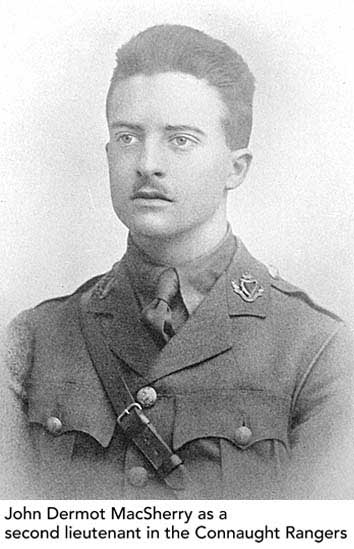The Charles Laughton pages ...
John Dermot MacSherry.|
|
|
|
|
|
|
|
|
|
| I am most grateful to David Knight, the Stonyhurst College archivist, for his invaluable help. This article has been enriched by information gleaned from Mr Knight's own article on Charles Laughton in the 2005 edition of 'The Stonyhurst Magazine', from information on MacSherry, taken from back issues of the same magazine and from the 'Stonyhurst War Record', as well as Miss Elsa Lanchester's autobiographical book 'Charles Laughton and I' (Faber and Faber, 1938). G. Porta | |
 |
Charles Laughton made his stage debut on December 1st 1913, in the play "The
Private Secretary", which was the play chosen by the Grammar boys for that year.
Laughton was cast in a secondary role as an inn-keeper, probably because the
directors of the play unimaginatively thought that the part would be suited to
the hotelier's son he was. The reviewer of "The Stonyhurst Magazine" was
pleasantly surprised by the fourteen-year-old debutante's performance: "We
were greatly taken by the acting of Charles Laughton as the solicitous old
lodging-house keeper. His part was far too short; we wanted more of him for it
seemed to suit him excellently".
Miss Elsa Lanchester, writing about her husband's first theatrical experience, stated the following: "This was the only occasion in which he was given a chance to act at school. The show was stolen by a fellow called MacSherry, who played Mr. Cattermole, and who in consequence remained Charles' hero for the rest of his school life". Indeed, MacSherry, playing the more substantial role of Mr. Cattermole, received an ecstatic review: "We must award the palm to Dermot MacSherry for his splendid performance as Mr. Cattermole. He looked the character to perfection. His voice, his corpulency, his complexion, his generosity with his money and his gouty walk, his meeting with the tipsy taylor, his disdain for the 'goods and chattels', and finally his sitting down on the sleeping 'medium' will not easily be forgotten". This was MacSherry's first theatrical triumph at the school, to be followed by his villainous Dr. Roylott in "The Speckled Band", a stage adaptation from one of Sir Arthur Conan Doyle's celebrated Sherlock Holmes' adventures (Incidentally, A. C. Doyle had been a student at Stonyhurst). In this role he made a greater impression, in spite of not a very appropriate make-up, which included a black beard which concealed half his face. The reviewer from "The Stonyhurst Magazine" wrote about his performance "So prolonged an exhibition of frightfulness we have rarely seen (...), and his periodical fits of depression and repentance raised the impersonation from being a monotonous display of savage temper into quite something of refined study of a complex temperament. There was a great deal of hard thought and careful interpretation to be seen in this very tiring part, which might so easily have become mere ranting and never did". |
Other parts he played at Stonyhurst were Mathias in "The Bells" and Portia in
"The Merchant of Venice". MacSherry was the only Stonyhurst student ever
mentioned by Laughton (as far as it can be gathered from printed source), so
from this (and Laughton's lifetime admiration for all kinds of performers,
whether they were amateur or professional, vaudeville comics or Shakespearian
tragedians) we assume that his recollections of MacSherry were indeed positive. Laughton was in the
school from 1912 to 1915, and MacSherry from 1911 to
1916. |
|
|
11/07/2017 |
The data on this page has very kindly been provided by Gloria Porta - many thanks to her and to all those mentioned for permission to use their information and research. Where possible all credit has been given to them and the original source quoted. |